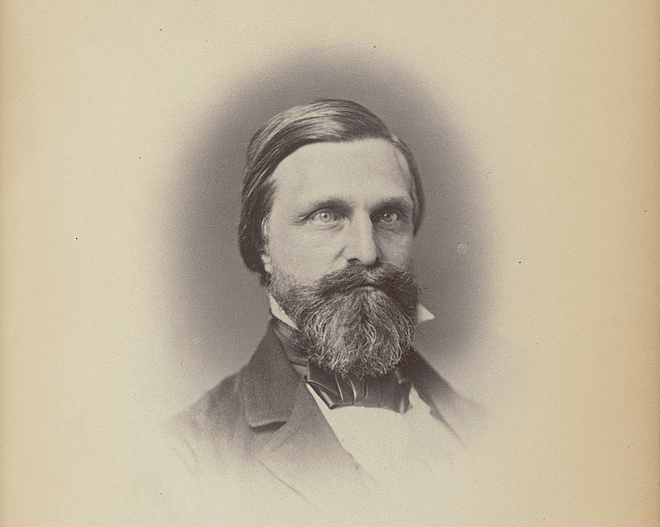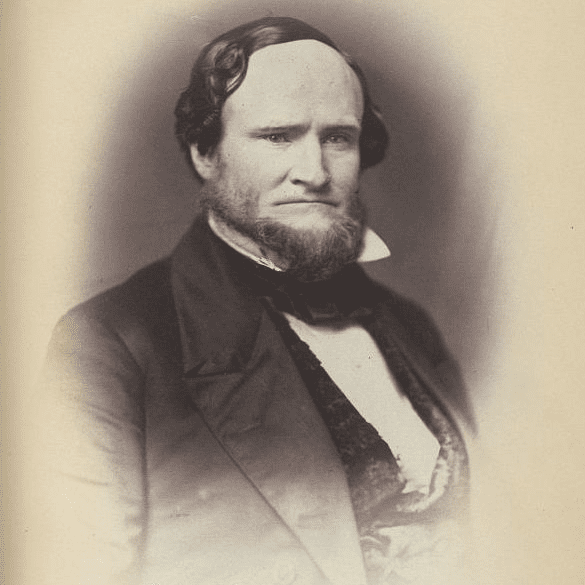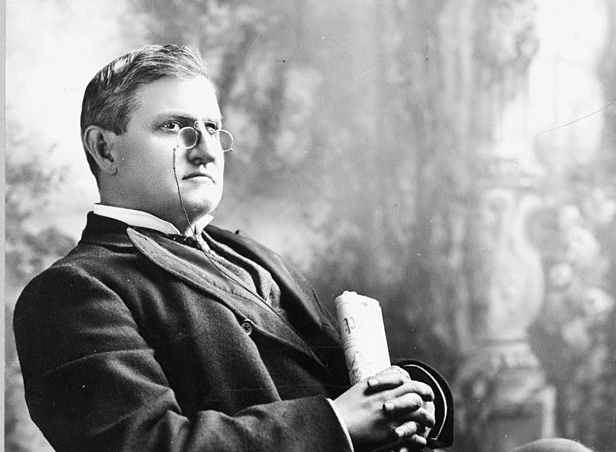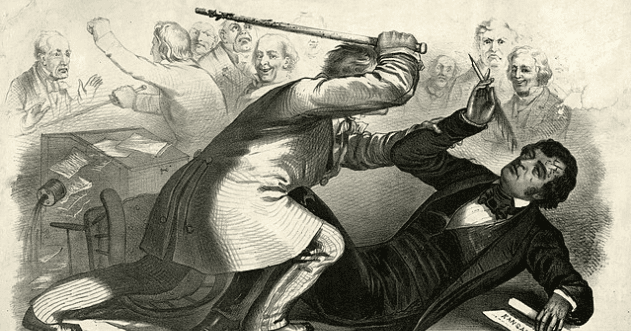Most of us know the story of Alexander Hamilton and Aaron Burr. Their famous 1804 duel, often highlighted in history lessons and even popular musicals, stands as a stark reminder of how heated political rivalries can become. But this infamous duel isn’t the only time American politics turned physically violent. Far from it, actually.
Throughout United States history, passionate disagreements have sometimes boiled over, leading to shocking acts that clash with democratic ideals. Some of these confrontations even resulted in death. Let’s delve into ten of the most intense and sometimes brutal political showdowns that have marked the American political landscape.
Top 10 Violent Political Feuds in American History
10. Matthew Lyon vs. Roger Griswold
Connecticut’s Roger Griswold and Vermont’s Matthew Lyon simply didn’t see eye to eye. Their animosity reached a boiling point in 1798. Lyon, a Republican, had insulted Griswold, a Federalist, by spitting tobacco juice in his eye and calling him a coward. When Lyon later argued against preparing for war with France, Griswold, who supported President John Adams’s firm stance, decided it was time for payback.
In late January, the House of Representatives debated expelling Lyon for the spitting incident. Griswold’s Federalist allies couldn’t gather enough votes. So, on February 15, the day after the vote failed, Griswold took matters into his own hands. He grabbed a hickory cane, approached Lyon on the House floor, and started beating him. Lyon, caught by surprise, defended himself by grabbing a nearby fire stoker, and a full-blown fight erupted.
Fellow members of Congress scrambled to separate the two men as they furiously attacked each other. Though they were eventually pulled apart, this ugly brawl was captured in political cartoons. These images showed the American public some of the earliest signs of deep, vicious partisan splits in their new nation’s politics.
9. John Quincy Adams vs. Andrew Jackson
The presidential election of 1828 between Andrew Jackson and John Quincy Adams was fueled by long-standing resentment. The two had competed four years earlier, with Adams securing victory amidst talk of questionable political maneuvers. When 1828 arrived, Adams’s campaign reportedly spread damaging rumors about Jackson’s wife, Rachel. Jackson won the election, but Rachel passed away before his inauguration. Jackson, deeply aggrieved, blamed Adams’s smears for contributing to her death.
On Inauguration Day in 1829, Jackson’s supporters were enraged. After he was sworn in, they surged into the White House. Adams had to make a hasty exit through a back door to avoid the angry mob seeking retribution for their leader and his late wife. Socialite Margaret Smith, an eyewitness, described a chaotic scene: “Ladies fainted, men were seen with bloody noses, and such a scene of confusion took place as is impossible to describe.”
8. Jonathan Cilley vs. William Graves
The 1830s were marked by intense political division. Democrats, among other things, felt major newspapers unfairly favored the rival Whig party. This frustration over media bias peaked in 1838. Early that year, Maine Representative Jonathan Cilley gave a speech in the House, accusing newspaper editor James Watson Webb of accepting bribes from Whig politicians. Webb was furious and challenged Cilley to a duel, asking Kentucky Representative William Graves to deliver his challenge letter.
When Graves presented the letter, Cilley refused to accept it. Graves felt slighted by this refusal and, in turn, challenged Cilley to a duel himself. Cilley, perhaps exasperated by the escalating situation, accepted. Despite no prior personal conflict between them, the two congressmen agreed to a rifle duel in February 1838. On the day of the duel, both Graves and Cilley missed with their first two shots. On the third exchange, Graves’s bullet struck Cilley, who tragically bled to death on the dueling grounds.
7. Thomas Hart Benton vs. Henry Foote
The death of influential South Carolina politician John C. Calhoun in 1850 should have been a moment for somber reflection. Instead, it became the spark for a bitter clash between lawmakers, foreshadowing the Civil War. The trouble began during a memorial for Calhoun when Mississippi’s Henry Foote and Missouri’s Thomas Hart Benton started trading insults. While it didn’t turn physical then, Vice President Millard Fillmore was concerned enough to warn the Senate on April 3 about personal attacks escalating.
Just two weeks later, Foote and Benton were arguing again in the Senate. During this heated exchange, Benton advanced towards Foote. Feeling threatened, Foote pulled out a pistol and aimed it at Benton. Fortunately, other senators intervened, persuading Foote to lower his weapon. The men were separated without bloodshed, but the intense partisan hatred, a precursor to the Civil War, was laid bare.
6. David Terry vs. David Broderick
Even members of the same political party weren’t immune to violent conflict. David Terry and David Broderick were both California Democrats in the 1850s but stood on opposite sides of the critical slavery issue. Terry, Chief Justice of the California State Supreme Court, supported slavery and wanted California to join the Union as a slave state. Broderick, a U.S. Senator from California, argued for it to be a free state. Their friendship crumbled as their public disagreement intensified in the lead-up to the Civil War. In 1859, Terry lost his re-election bid for the state Supreme Court.
Furious about his defeat, Terry blamed Broderick’s anti-slavery stance. In a post-campaign speech, Terry insulted his former friend. Broderick responded with his own public insults, and the stage was set. Terry challenged Broderick to a duel. On September 13, 1859, they met. Broderick won the coin toss for position, but Terry got to choose the weapons. Terry’s choice of pistols, unfamiliar to Broderick, proved decisive. Broderick’s gun misfired, but Terry’s found its mark, and Broderick was fatally wounded. The anti-slavery politician became a martyr for his cause, while Terry later fled California to fight for the Confederacy.
5. Preston Brooks vs. Charles Sumner
In May 1856, Massachusetts Senator Charles Sumner, a fervent abolitionist, delivered a fiery anti-slavery speech titled “The Crime Against Kansas.” In it, he harshly criticized several pro-slavery senators, including Andrew Butler of South Carolina, whom he accused of taking “a mistress… ugly to others… who is chaste in his sight—I mean the harlot, Slavery.” Butler wasn’t present, but his cousin, South Carolina Representative Preston Brooks, heard about the speech.
Three days later, an enraged Brooks entered the Senate chamber and confronted Sumner, who was seated at his desk. Brooks brutally attacked Sumner with a heavy, metal-tipped cane, striking him repeatedly over the head until Sumner collapsed, bloody and nearly unconscious. Brooks continued the assault for over a minute before finally leaving. Stunned senators rushed Sumner to a doctor. Brooks was censured and resigned from the House, but his constituents in South Carolina hailed him as a hero and re-elected him. Sumner, though severely injured, eventually recovered and served three more terms. This violent episode, known as “the caning of Charles Sumner,” is widely seen by historians as a pivotal moment pushing the nation towards the Civil War.
4. “Bowie Knife” Potter vs. Roger Pryor

Four years after Charles Sumner’s caning, another congressional confrontation further inflamed tensions. In 1860, Illinois Representative Owen Lovejoy, an abolitionist, was debating the morality of slavery with Virginia’s Roger Pryor. As Lovejoy spoke against slavery, Pryor, a pro-slavery congressman, jumped up and waved his fist in Lovejoy’s face. Angered by this disrespect, Wisconsin Representative John Fox Potter began shouting at Pryor, who then accused Potter of interfering.
Pryor challenged Potter to a duel, a common, if dangerous, way of settling disputes at the time. Potter accepted but with a shocking condition: they would fight hand-to-hand with bowie knives. Pryor, taken aback by the brutal terms, backed down. Potter’s fierce defense of Lovejoy and abolitionism instantly made him famous, while Pryor’s retreat drew scorn. Potter earned the nickname “Bowie Knife,” and admirers sent him bowie knives from all over the country. While the incident brought Potter acclaim, it also marked another step in the country’s descent into war.
3. “Bowie Knife” Potter Returns for More

The issue of Kansas’s admission to the Union was a major flashpoint leading to the Civil War. Southern politicians insisted Kansas allow slavery, while Northern abolitionists demanded it be a free state. These disagreements often turned violent. In 1858, during a heated House debate on Kansas, Pennsylvania Republican Galusha Grow and South Carolina Democrat Laurence Keitt began trading insults. Emotions ran high, and the two men started to physically fight. Disturbingly, dozens of other congressmen joined in.
The House chamber quickly devolved into a massive brawl, with over 30 members throwing punches. Even the arrival of police couldn’t stop the fighting. Then, John Fox Potter, of “Bowie Knife” fame, ended the chaos in an unexpected way. Alongside fellow Wisconsin Representative Cadwallader Washburn, Potter snatched the toupee from the head of Mississippi Representative William Barksdale. The sudden sight of Barksdale’s bald head shocked everyone. Fistfights turned into laughter as members from both sides paused to mock Barksdale. This bizarre interruption allowed the sergeant-at-arms to separate the combatants and end the brawl.
2. Robert Robertson vs. Indiana General Assembly
In 1886, Indiana Governor Isaac P. Gray, a Democrat, was anticipated to fill a vacant U.S. Senate seat. This meant the state’s General Assembly needed to choose his replacement and a new lieutenant governor. Most expected Senate President Alonzo G. Smith, also a Democrat, to win the lieutenant governor spot. Surprisingly, Republican Robert S. Robertson won the vote instead. Angered by this outcome, Democratic members of the General Assembly tried for weeks to prevent Robertson from taking office.
On February 23, 1887, the Indiana Supreme Court ruled in Robertson’s favor. The next day, Robertson went to the state capitol to claim his seat. A doorkeeper reportedly grabbed Robertson by the throat and threw him about “15 or 20 feet from the steps.” The disgruntled Smith ordered attendants to remove Robertson, leading to pushing, shoving, and fighting between factions. Robertson addressed his supporters outside, sparking another altercation. Eventually, Robertson was seated. The turmoil had lasting effects; it was one of several incidents that contributed to the ratification of the 17th Amendment, which established the direct election of U.S. senators by the public.
1. John McLaurin vs. Benjamin Tillman

John McLaurin became South Carolina’s junior U.S. Senator in 1896, largely thanks to Benjamin R. Tillman, the state’s senior senator, former governor, and McLaurin’s long-time mentor. Once in office, however, McLaurin began to drift away from Tillman’s political positions. On February 22, 1902, during a Senate debate about annexing the Philippines, Tillman delivered a harsh speech. He accused McLaurin of being corrupted by “improper influences.” McLaurin wasn’t present but quickly heard about Tillman’s words and rushed into the chamber.
McLaurin confronted Tillman, calling his accusation a “malicious and deliberate lie.” The enraged Tillman lunged at his former protégé, and a fistfight broke out. Tillman reportedly struck McLaurin and several other senators who tried to separate them. Later that day, a closed Senate session intended for apology and reconciliation backfired, and the two nearly came to blows again. Six days later, the Senate censured both men. McLaurin’s political career ended later that year when he lost his re-election bid. He and Tillman never reconciled.
These ten incidents, ranging from cane beatings and duels to outright brawls on the floors of Congress, paint a vivid picture of how passion and principle have sometimes led to physical conflict in American political history. They remind us that the path of democracy hasn’t always been smooth, and that vigorous debate, while essential, can sometimes cross dangerous lines.
What are your thoughts on these historical political feuds? Do any of these stories particularly surprise you? Leave your comment below!










